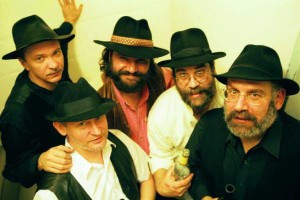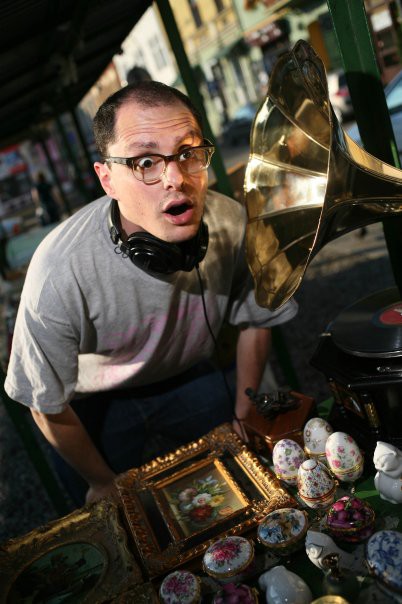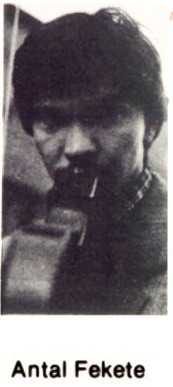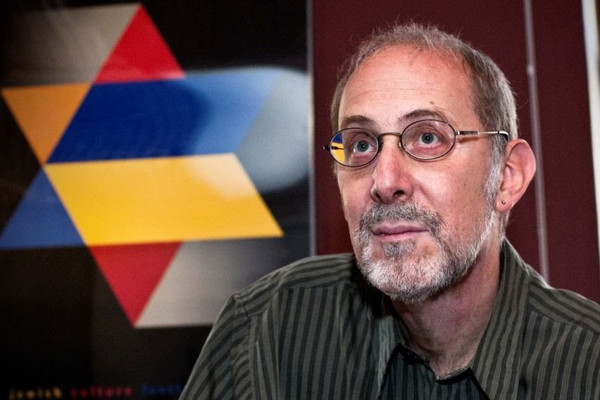
Di Naye Kapelye
Band,
Folk
Yiddish culture in east Europe today is but a dim shadow of its history and legacy, but it is not dead. Jewish communities exist – in diminished numbers – and Jewish life continues, not the least in the memories of an older generation who remember a world which spoke Yiddish. Di Naye Kapelye means "The New Band" in Yiddish. We play old-time Yiddish music from not so long ago. This is music for dancing, for singing, for celebrating, and for remembering. Di Naye Kapelye approaches klezmer music as a living east European folk music tradition, not as nostalgia. Performances are both energetic and informative, with dance music from east Europe -- particularly Hungary, Romania and Moldova, Yiddish folk song, and more recently, reinventions of Hasidic traditional song, all played with attention to each particular regional style. Formed in 1994 through a number of fortuitous circumstances, many involving liberal quantities of palinka –Hungarian plum brandy – at marathon Hungarian folk dances, founding member Bob Cohen assembled an international group of musicians devoted to digging for the roots of Yiddish music in the Carpathian region. But they didn’t go looking in museums. Fragments turned up in old recordings, were learned from gypsy fiddlers, and confirmed by Jewish folk still living here. Is this how this goes? What instruments would have been used? How did people dance? What did people sing? A Naye Kapelye concert is a tour of the places, moods, emotions, tastes and smells of a Jewish celebration. It brings you to the rabbi's table, it speaks of forbidden dancing with Moldavian "sharletankes", it speaks of whiskey and the misery of life in the Russian army. Cohen himself began collecting Jewish music in Hungary and Romania in the 1980s as an extension of his involvement in the Hungarian tanchaz or "dance house" movement. Based on field recordings, interviews, and historic recordings, Di Naye Kapelye recreates the sound of the many non-commercial Jewish bands who served Jewish communities in Europe as late as the 1970s. In Hungary, and particularly in Transylvania, Gyspies commonly played music for Jewish communities, and members of Di Naye Kapelye continue to do extensive field research among elderly Gypsy and Jewish musicians, recording and often playing with their teachers, carrying this living tradition into the 21st century. But tradition does not imply stuffiness: Di Naye Kapelye sees tradition as a viable, alternative aesthetic for today. Di Naye Kapelye is as at home playing in alternative music clubs as they are playing for Jewish weddings and Jewish old-age homes in Hungary. Di Naye Kapelye is available for concerts, festivals, weddings and other simchas, as well as other collaborations. Bob Cohen (violin, mandolin, koboz, cumbus, flutes, Carpathian drum, vocals). Born in New York City into a Yiddish-speaking family, Bob came to Hungary in 1988 to research the traditional Jewish musical repertoire of the Carpathian region. Bob formed Di Naye Kapelye to present Carpathian klezmer music in its most authentic form. A member of the Jewish Music Research Center at Budapest's ELTE University, Bob has done extensive field research in klezmer and Yiddish music in Eastern Europe, the United States, and Israel. A founding member of the Budapester Klezmer Band, Bob has also performed and toured with Budowitz. He has served as musical consultant for numerous productions and has arranged music for theater and film, most notably the work of Miklos Jancso and the film "Jacob the Liar". Yankl Falk (clarinet, vocals) performs with Di Naye Kapelye on most European tours. A traditional Jewish cantor and clarinetist from Portland, Oregon, Yankl first came to Budapest as music director for a production of the classic Yiddish play "Dybbuk." Yankl is recognized for his soulful interpretations of Yiddish song and Hasidic chant. Yankl "belts out Hasidic liturgical melodies with the gravely punch of a Big Jay McShann" (Lev Liberman, The Jewish Review). His singing "returns us to a time when the power of the voice could tell a story and move an audience" (Ari Davidow, Klezmer Shack). Yankl has toured extensively throughout Europe and North America, working with such groups as Oomph! and Don Byron's Music of Mickey Katz. For over 30 years, Yankl has produced the Sunday morning Yiddish Hour on KBOO-FM in Portland. Ferenc Pribojszki (cimbalom, Carpathian drum). Former cimbalomist of the Hungarian State Folk Ensemble, and member of the Bekes Band, Feri is a well-known musician in the Budapest “tanchaz” scene. He also plays Moldavian flutes and harmonica. Gyula Kozma (bass and koboz). Former member of the Okros band and the Csiky Band, “Kosztya” has played three-string Hungarian folk bass for decades in the “tanchaz” movement in Hungary. Kosztya's other musical interests include American blues and koboz - an archaic Romanian fretless lute. Antal Fekete (kontra), also known as “Puma”, was born in Gyula, Bekes County, in the “stormy corner” of the southern Hungarian Plains. Originally a dancer, he began playing the three-stringed Transylvanian “kontra” viola in the 1970s, and soon became one of the instrument’s undisputed masters. While a member of the Hungarian traditional band “Ujstilus”, Puma also carried out extensive field research and recording of older master musicians in Transylvania. He is also the most sought-after maker of kontras.
Members
 | Josh Dolgin p, acc CA |
 | Antal Fekete vl |
 | Michael Alpert vn, voc *1955 US |
 | Kozma Gyula b, vc |
 | Bob Cohen vn, man, voc |
 | Ferenc Pribojszki dr |
 | Misu Csernavec cym |
 | Yankl Falk cl, voc |
 | Aron Cohen voc |
 | Ivan Popovics vn |
 | Jura Csernavec voc, dr |
Popular Tracks 

Track list and 30sec audio provided by ![]()
Discography
| Title | Artist | Year | Type |
|---|---|---|---|
| Traktorist | Di Naye Kapelye | 2008 | Album |
| A Mazeldiker Yid | Di Naye Kapelye | 2001 | Album |
| Di Naye Kapelye | Di Naye Kapelye | 1998 | Album |
